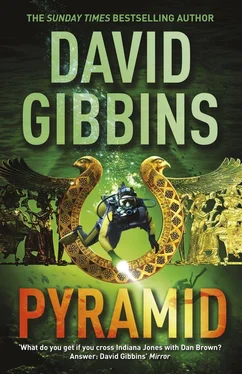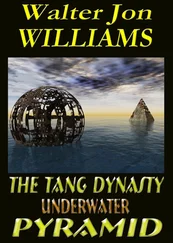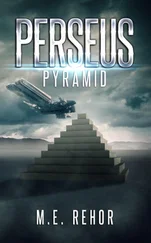Suddenly there was a commotion in the line behind him and he heard a shrieking voice, the high-pitched voice he remembered from the audience in the ministry. Jack knew enough Arabic to understand what he was saying. “It is Jack Howard, the archaeologist Jack Howard . He is a blasphemer, a destroyer of sacred works. Arrest him!”
Jack glanced over his shoulder and saw the man struggling to point toward him, his eyes wide and panic-stricken. And then one of the gunmen slammed his rifle butt into the man’s face, thrusting his lolling head back as he was carried forward in the line. Jack grabbed Costas, ducked down, and pushed through the cordon. “Come on. Our cover’s been blown. We’ve got to run.”
They rushed forward past the clusters of people heading toward the square and then ducked down an alley to the left. Jack had no idea where they were going; this was pure survival. Seconds later he heard booted feet pounding down the alley behind him, and a crack of rifle fire. Two men holding Kalashnikovs appeared out of nowhere in front. He and Costas barrelled through them, sending both men sprawling. Jack stumbled, snatching up one of the rifles as he did so, and pushed Costas ahead. “Run,” he yelled. “Run.” He turned, firing a burst into the air above their pursuers, his hands jarring with the clacking of the bolt. Chunks of brick and masonry fell from the upper story where the bullets had hit the wall, but still the men kept coming. One of them fired back, the bullets striking the walls of the alleyway ahead and filling the air with dust. Jack lowered the rifle, holding the wooden barrel guard to stop it from jumping, and fired a long burst into his attackers, seeing several of them jerking and falling. Another man lunged toward him only yards away. He pulled the trigger again, but the bolt was open; the magazine was empty. He threw it down, pulled out his Beretta, and turned to run, seeing Costas in the dust ahead. A rifle cracked deafeningly behind him, and the air was filled with shrieking and yelling.
Suddenly he was knocked sideways and sent sprawling in the dust. Then he was raised onto his knees and pushed against the alley wall, his arms pulled savagely behind his back and his wrists tied. Someone pulled him up by his hair and dragged him along, slamming him against the wall. The pain from his hair was eye-watering, but he was too dazed to care. He saw Costas alongside him, spitting blood from his mouth, and was conscious of a circle of gunmen forming around them, Kalashnikovs raised.
Somebody, a leader in the group, was talking, too fast for Jack to understand, but he guessed that their lives were in the balance. He stared at the intricate pattern in the granite of the wall in front of him, trying to focus on that, and breathed in deeply through his nose, smelling the dust and stone. He caught Costas’ eye, but they both knew better than to talk. Each knew what the other was thinking. After more than their share of near-misses underwater, of danger they accepted as part of their calling, it seemed a perversity of fate that they should die like this, in a squalid execution in a back alley of Cairo. Jack felt numb; all emotion seemed to have drained from him in the square. The argument behind them stopped, and there was a silence. Suddenly there was a deafening rip of gunfire, and chips flew off the rock above his head. Jack was thrown forward against the wall, and felt a hammer-blow of pain in his right arm. His knees give way, and he fell, seeming to fall a long way as if he were going far beneath the ground, back to that place from which he and Costas had just emerged, into a well of blackness. Then nothing.
Jack recovered consciousness moments later as he was being hauled to his feet. He was aware of Costas alongside him as the two of them were shoved ahead by the gunmen down the alley. Costas already had his hands zip-tied behind his back, and Jack felt his own arms being pulled roughly together, causing a jolt of pain to course through him from the bullet wound in his right shoulder. His arm was dripping with blood, and out of instinct he played it up, bending over and yelling with pain each time they tried to pull it back. Someone shouted in Arabic and they relented, tying his wrists in front of him instead. At the end of the alley they were hustled into the back of a pickup. They were made to lie facedown and had hoods pulled over their heads. Jack braced himself as the truck revved up and screeched down the road. He was trying to keep his head from banging where it had been bruised when he hit the wall in the alley and been knocked out momentarily.
He forced himself to assess the situation. His right arm was still functional, but he could feel the stickiness of the blood on his hand and the numbness where shock was still overriding the pain of the wound. He knew that they had been reprieved, that someone had stayed their execution; there was some small hope in that. It was not the way of the extremists to carry out mock executions, so someone among the gunmen must have seen something, perhaps their CNN press cards, and ordered his men to fire high. Where they were going now was anyone’s guess, back to the killing ground of the square, perhaps, to face the judgment of someone higher up the chain of command, or to some hidden place to await an ignominious end, to join the many like the girl Sahirah who had already been arrested by extremist sympathizers before the coup, and would provide another wave of victims as the gunmen finished their first round of executions and swept through the city looking for more. Jack was thankful that Aysha and Lanowski had not been with them in the alley; he desperately hoped that they had not tried to follow but had made their own way to the felucca to make good their own escape.
The truck screeched to a halt and they were bundled out of the back, up a shallow flight of steps into a large space that echoed with shouts and commands in Arabic, and then up a flight of stairs, along a corridor, through some doors, and into a smaller space, where they were roughly forced to a halt. Jack’s hood was pulled off, and he blinked hard, looking around. He was standing beside Costas in an office of a minor government functionary by the look of it, with a desk and filing cabinets and a glass screen to the corridor outside. Two gunmen with wispy beards and black headbands loitered outside the door, and another two were inside the room facing them. One of them let his rifle hang on its sling, pulled some leaves from a bag, and began chewing on them, and the other asked for some, in English with a broad Yorkshire accent. Jack stared at the man with contempt. He knew that the gunmen included radicalized Western sympathizers, just like the other extremist groups elsewhere. Jack glanced at the gunmen in the corridor, and then back at the two who were chewing khat; they would be the easiest to deal with if the opportunity arose.
Another man walked into the room; he was short and dapper with a thick beard, and wore a white robe beneath his ammunition vest. He was carrying Jack’s Beretta with the spare magazines and Costas’ Glock, and placed them on the desk. He clicked his fingers at the two men, who slung their weapons on their backs and came up behind and frisked Jack and Costas. Jack could smell the khat on their breath, and stale sweat. They found nothing, and Jack saw that the zip pocket where Costas had put the camera microchips was open and empty. He must have destroyed and ditched them back in the alley as the gunmen were closing in. Jack could barely think about that now; his arm was beginning to throb and he felt faint. The small man perched on the edge of the desk, picked up the Beretta, turned it over, put it down again, and then gestured at the press card still hanging around Jack’s neck.
Читать дальше












